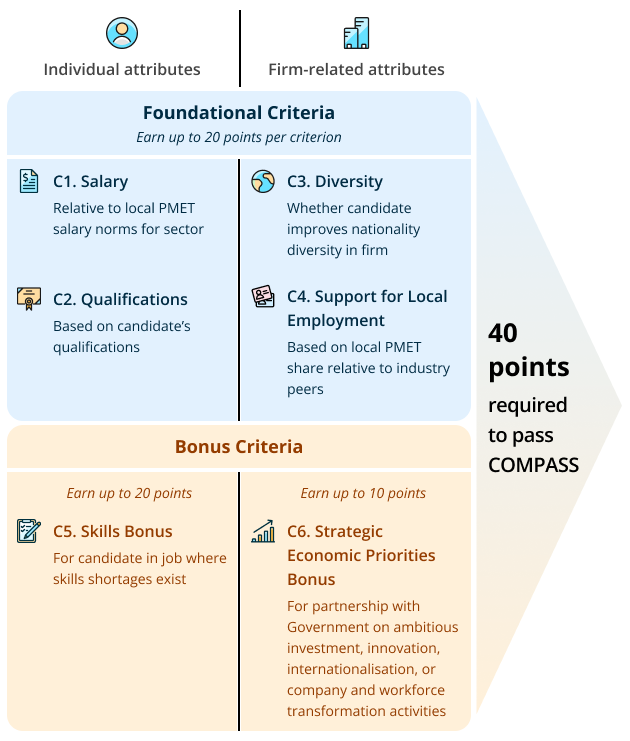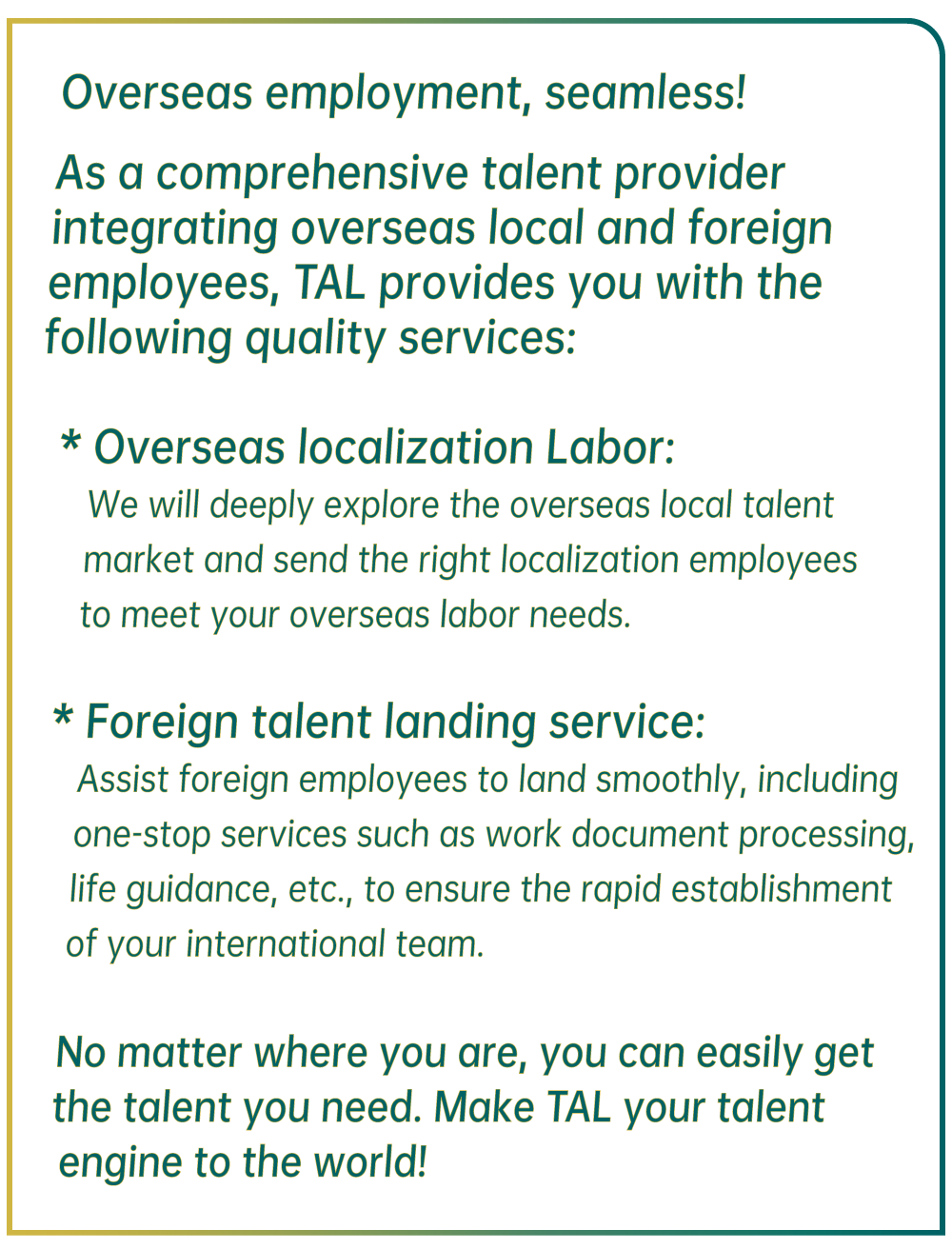If your company is planning to expand in Singapore, then you must ensure that every employee has a Singapore work visa in order to guarantee that they can work and live in the country legally. As for the type of work visa an employee can apply for, it depends on the individual's skills, degree, qualification, industry experience or expertise, among others.
Below, we will introduce the three types of work visas in Singapore in detail: EP, SP and WP.

Work visas in Singapore are reviewed and issued by the Ministry of Manpower (MOM). Specifically, Work visa applications in Singapore need to be submitted to the MOM for approval, including Employment Pass (EP) and S Pass (SP), Work Permit (WP), etc. Employers are responsible for submitting work visa applications to MOM and providing relevant application materials and supporting documents such as the applicant's personal information, academic credentials, work history, etc. MOM will assess and approve the application based on the applicant's qualifications and conditions, as well as the nature of the employing company. The approval period is usually within 1 month. Once approved, the successful applicant will be granted the corresponding work visa and can legally reside and work in Singapore.
If the pass holder wants to change jobs, the new employer will have to apply for a new employment Pass and the current employer will need to cancel the existing employment Pass. If the Pass holder obtains Singapore Permanent resident status or terminates his/her employment , the Pass will need to be cancelled.
I、Types of work pass in Singapore:
The common types of Work permits for foreigners in Singapore are the Employment Pass (EP), S Pass (SP) and Work Permit (WP). The details are as follows:
1. Employment Pass (EP) :
* For senior managers, technical experts and professionals;
* Applicants need to have a university degree or equivalent and have an average monthly salary of at least S $5,000; From January 1, 2025, the minimum salary requirement for pass applicants in the general industry will increase to S $5,600, and for those working in the financial industry, the minimum salary will increase to S $6,200.
* Pass applications, which are initiated by employers and applied for for the first time, are usually valid for 1-2 years;
* Qualification assessment: Applicants need to earn at least 40 points under the Complementary Expertise Assessment Framework (COMPASS) points system;
* EP holders can legally work in Singapore. If the fixed salary reaches at least SGD 6,000 or above, they can bring their family members to settle in Singapore. Family members need to apply for a Dependent Pass.
2. S Pass (SP) :
* Suitable for middle and senior skilled workers and some professionals;
* Applicants need to earn at least S $3,150 a month; From September 1, 2025, the minimum salary requirement for pass applicants in the general industry will increase to S $3,300, and for those working in the financial industry, the minimum salary will increase to S $3,800.
* For SP applications, companies are subject to quotas, depending on the industry they are in. No more than 60% of the total number of employees in manufacturing, 35% in services and 83.3% in construction; 77.8 percent in shipping;
* usually valid for 1-2 years;
* S Pass holders can legally work in Singapore. If the fixed salary reaches at least SGD 6,000 or above, they can bring their family members to settle in Singapore, and the family members need to apply for a Dependent Pass.
3. Work Permit (WP) :
* For low-skilled workers and unskilled labor, such as construction workers, cleaners, etc.;
* Applicants do not need a university degree, but need to meet the minimum monthly salary and other eligibility requirements;
* WP applies, and companies are subject to quotas, depending on their industry;
* The Work Pass is an employer-initiated application and its validity varies according to occupation and nationality;
* WP holders can legally work in Singapore, but are subject to more restrictions and cannot bring family members directly to Singapore.
It is important to note that the specific visa types and requirements may vary depending on individual circumstances and changes in policy. Therefore, if you have specific visa needs or questions, it is recommended that you consult TALINK for up-to-date and accurate information.
II、COMPASS Scoring Criteria for the Singapore EP Employment Pass:
From Sept 1, 2023, Singapore will implement the latest Employment Pass (EP) points system, which will require EP applicants to not only meet the most basic salary threshold, but also score 40 points under the Complementary Expertise Assessment Framework (COMPASS) in order to apply for an EP. While existing EP holders who need to renew will be subject to the new criteria from Sept 1, 2024.
There are six dimensions to the COMPASS score, and EP applicants must earn a total of at least 40 points in the four basic items and two additional incentive items of the COMPASS assessment Framework. These assessments assess the applicant's background at both the individual and company levels, and the specific assessment criteria are shown in the chart below:

III、Factors for changes in Singapore's SP and WP quota limits:
The quota limits for Singapore's S Pass(SP) and Work Permit(WP) are subject to change based on several key factors:
1. Type of industry:
* The proportion of foreign employee quota varies in different industries;
* For example, the proportion of quotas for manufacturing, services, construction and catering varies;
* The government will adjust the relevant quota policy according to the development needs of the industry;
2. Enterprise size:
* The total number of employees will affect the proportion of foreign employees;
* Small and medium-sized enterprises usually have a higher proportion of foreign employees;
* The government will adjust the quota according to the size of the enterprise;
3. Economic situation:
* When the economic environment is better, the government may appropriately relax the quota of foreign employees;
* When the economy is in a downturn, the government may tighten the quota policy to protect local employment;
4. Adjustment of policy targets:
* The government will adjust the quota according to the supply and demand of the labor market and the policy objectives;
* such as strengthening protection for local workers or attracting needed foreign talent;
5. Industry development needs:
* Some key industries such as science and technology, manufacturing, etc., the government may give more favorable quota policies;
* to meet the demand for highly skilled foreign talent in these industries;
In general, Singapore's foreign worker quota policy is dynamically adjusted and subject to appropriate changes based on factors such as the economic situation, industry demand and so on. This helps to balance the local job market, but it is also relatively limited in the number of SP and WP employees that companies can hire.
IV、Our strengths:
At present, TAL has the strength and resources to provide you with a full range of solutions and support. Whether you have an urgent need for SP and WP, or are eager to get the help of EP, TAL can draw on the rich experience and professional team to plan and solve your problems. Strength escort, to ensure that your various visa applications are successful, so that your road to development is smooth! Trust TAL to start a new chapter of success.





 Home
Home
 Solutions
Solutions
 Resources
Resources
 Contact
Contact